中考英语——四大基本时态
四种基本时态总结
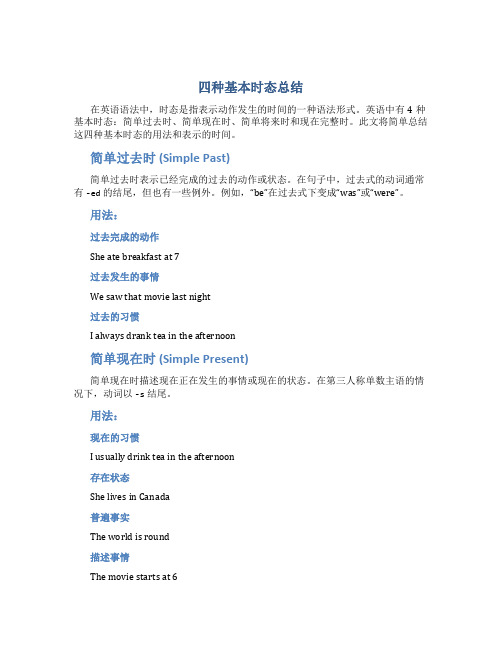
四种基本时态总结在英语语法中,时态是指表示动作发生的时间的一种语法形式。
英语中有4种基本时态:简单过去时、简单现在时、简单将来时和现在完整时。
此文将简单总结这四种基本时态的用法和表示的时间。
简单过去时 (Simple Past)简单过去时表示已经完成的过去的动作或状态。
在句子中,过去式的动词通常有-ed的结尾,但也有一些例外。
例如,“be”在过去式下变成“was”或“were”。
用法:过去完成的动作She ate breakfast at 7过去发生的事情We saw that movie last night过去的习惯I always drank tea in the afternoon简单现在时 (Simple Present)简单现在时描述现在正在发生的事情或现在的状态。
在第三人称单数主语的情况下,动词以-s结尾。
用法:现在的习惯I usually drink tea in the afternoon存在状态She lives in Canada普遍事实The world is round描述事情The movie starts at 6简单将来时 (Simple Future)简单将来时用于表示将来某个时间会发生的事情。
可以使用情态助动词will 和shall加上动词原形,也可以使用动词原形来表示未来。
用法:趋势I think gasoline prices will go up.决定或意愿I’ll help you with that homework after dinner在特定的时间或时间段内发生I’ll finish my homework by 9 PM现在完成时 (Present Perfect)现在完成时通常用于强调过去发生的事情与现在的联系。
它与简单过去时明显不同,因为它包括从过去开始,延续到现在或在过去一点时间内的动作或状态。
在句子中,现在完成时通常使用have或has和动词的过去分词。
中考初中英语必考八种基本时态
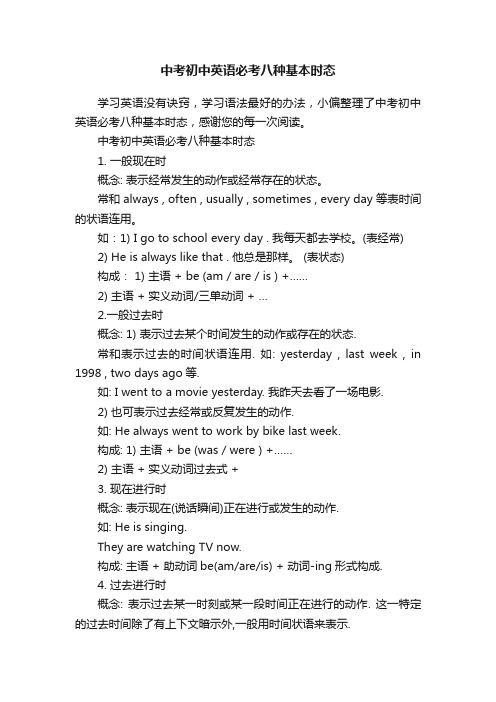
中考初中英语必考八种基本时态学习英语没有诀窍,学习语法最好的办法,小偏整理了中考初中英语必考八种基本时态,感谢您的每一次阅读。
中考初中英语必考八种基本时态1. 一般现在时概念: 表示经常发生的动作或经常存在的状态。
常和 always , often , usually , sometimes , every day 等表时间的状语连用。
如:1) I go to school every day . 我每天都去学校。
(表经常)2) He is always like that . 他总是那样。
(表状态)构成: 1) 主语+ be (am / are / is ) +……2) 主语 + 实义动词/三单动词+ …2.一般过去时概念: 1) 表示过去某个时间发生的动作或存在的状态.常和表示过去的时间状语连用. 如: yesterday , last week , in 1998 , two days ago等.如: I went to a movie yesterday. 我昨天去看了一场电影.2) 也可表示过去经常或反复发生的动作.如: He always went to work by bike last week.构成: 1) 主语+ be (was / were ) +……2) 主语 + 实义动词过去式 +3. 现在进行时概念: 表示现在(说话瞬间)正在进行或发生的动作.如: He is singing.They are watching TV now.构成: 主语 + 助动词be(am/are/is) + 动词-ing形式构成.4. 过去进行时概念: 表示过去某一时刻或某一段时间正在进行的动作. 这一特定的过去时间除了有上下文暗示外,一般用时间状语来表示.如: 1) ---What were you doing?---I was jumping.2) ---What was the boy doing when the UFO arrived?---He was sleeping.构成: 主语 + 助动词be(was/were) + 动词-ing形式构成.5. 一般将来时概念: 表示将来某个时间要发生的动作或存在的状态,也表示将来经常或反复发生的动作,常与表示将来的时间状语连用,如: tomorrow, next week, next year, in the future等.如: He will go shopping tomorrow.They are going to play basketball next week.构成: 1) 主语 + 助动词will + 动原+…2) 主语 + be going to + 动原+ ….6. 过去将来时概念: 表示在过去将来的某一时间发生的动作或存在的状态.构成: 1) 主语(第一人称) + 助动词should + 动原+…2) 主语 + would + 动原+ ….3) 主语 + was/ were going to +动原…用法: 过去将来时除了上下文暗示外,一般常用在间接引语中,主句谓语动词为过去时态.如: 1) I should go.2) You knew I would come.3) They were going to Naning.7. 现在完成时构成: 主语 + 助动词 ( have / has ) + 动词过去分词+…用法例句表示过去发生或已经完成的动作对现在造成的影响或结果. ---Have you had your lunch yet?---Yes, I have. (现在我不饿了)8. 过去完成时构成: 主语 + 助动词 had + 动词过去分词+…用法例句表示过去在过去某一时间或动作之前已经发生或完成了的动作.它表示的动作发生的时间是”过去的过去”.表示过去某一时间可用by, before 等构成的短语,也可用when, before, 等引导的从句或者通过上下文表示.I had finished my homework when my mom came back home.初中英语成绩提高一、每天背单词(这一关躲不掉),直到你可以比较轻松的看一篇不太难的阅读理解(理解大概内容)。
四大时态知识点总结
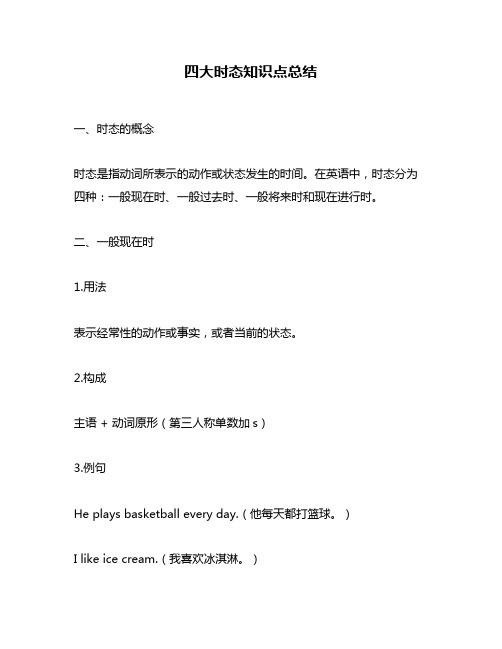
四大时态知识点总结一、时态的概念时态是指动词所表示的动作或状态发生的时间。
在英语中,时态分为四种:一般现在时、一般过去时、一般将来时和现在进行时。
二、一般现在时1.用法表示经常性的动作或事实,或者当前的状态。
2.构成主语 + 动词原形(第三人称单数加s)3.例句He plays basketball every day.(他每天都打篮球。
)I like ice cream.(我喜欢冰淇淋。
)三、一般过去时1.用法表示过去发生的动作或状态。
2.构成主语 + 动词过去式3.例句She went to the park yesterday.(她昨天去了公园。
)I studied English last night.(我昨晚学习了英语。
)四、一般将来时1.用法表示将来要发生的动作或状态。
2.构成主语 + will + 动词原形3.例句I will go to the beach tomorrow.(我明天会去海滩。
)She will study hard for the exam next week.(她下周会努力学习考试。
)五、现在进行时1.用法表示现在正在进行的动作。
2.构成主语 + am/is/are + 现在分词3.例句She is watching TV now.(她正在看电视。
)They are playing soccer in the park.(他们正在公园里踢足球。
)六、时态的转换1.一般现在时转一般过去时:动词加-ed或变成不规则动词过去式。
2.一般现在时转一般将来时:主语 + will + 动词原形。
3.一般过去时转现在完成时:have/has + 过去分词。
4.现在进行时转一般现在时:动作已经完成,改用一般现在时。
七、注意事项1.时间状语的使用,如now、yesterday、tomorrow等。
2.第三人称单数形式的变化,如he/she/it加s。
3.特殊情况下的变化,如be动词的变化和不规则动词的变化。
中考时态知识点归纳
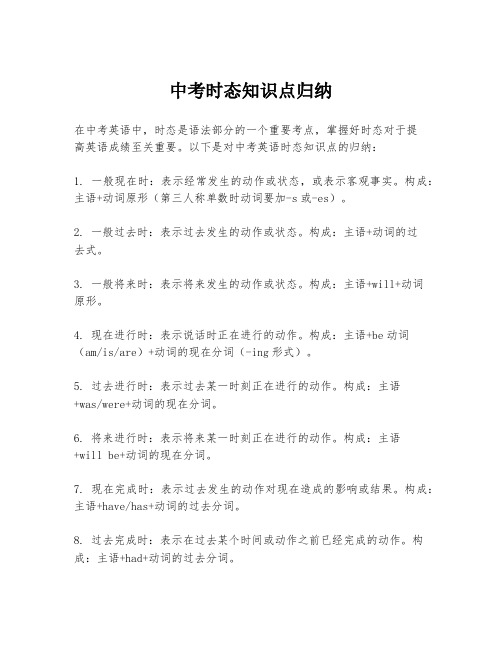
中考时态知识点归纳在中考英语中,时态是语法部分的一个重要考点,掌握好时态对于提高英语成绩至关重要。
以下是对中考英语时态知识点的归纳:1. 一般现在时:表示经常发生的动作或状态,或表示客观事实。
构成:主语+动词原形(第三人称单数时动词要加-s或-es)。
2. 一般过去时:表示过去发生的动作或状态。
构成:主语+动词的过去式。
3. 一般将来时:表示将来发生的动作或状态。
构成:主语+will+动词原形。
4. 现在进行时:表示说话时正在进行的动作。
构成:主语+be动词(am/is/are)+动词的现在分词(-ing形式)。
5. 过去进行时:表示过去某一时刻正在进行的动作。
构成:主语+was/were+动词的现在分词。
6. 将来进行时:表示将来某一时刻正在进行的动作。
构成:主语+will be+动词的现在分词。
7. 现在完成时:表示过去发生的动作对现在造成的影响或结果。
构成:主语+have/has+动词的过去分词。
8. 过去完成时:表示在过去某个时间或动作之前已经完成的动作。
构成:主语+had+动词的过去分词。
9. 将来完成时:表示将来某个时间之前已经完成的动作。
构成:主语+will have+动词的过去分词。
10. 现在完成进行时:表示从过去某一时间开始,一直持续到现在,并且可能还要继续下去的动作。
构成:主语+have/has been+动词的现在分词。
11. 过去完成进行时:表示在过去某一时间之前开始,一直持续到过去某一时间的动作。
构成:主语+had been+动词的现在分词。
12. 被动语态:表示动作的承受者而非执行者。
被动语态的构成根据时态不同而变化,一般形式为:be动词的各种时态形式+动词的过去分词。
掌握这些时态的构成和用法,对于理解和运用英语时态至关重要。
在复习时,可以通过做练习题、阅读例句和进行实际对话来加深理解。
同时,注意时态之间的转换和使用场合,以确保在中考中能够准确无误地使用各种时态。
结束语:通过上述的归纳,希望同学们能够对中考英语中的时态有一个清晰的认识和掌握,为中考取得优异成绩打下坚实的基础。
2024中考英语语法必考知识点总结

2024中考英语语法必考知识点总结一、时态1.一般现在时:表经常性的动作、习惯或客观事实。
2.一般过去时:表示过去发生、结束的动作或状态。
3.一般将来时:表示将来一些时间要发生的动作。
4.现在进行时:表示现在正在进行的动作。
5.过去进行时:表示过去其中一时刻或一段时间内正在进行的动作。
6.现在完成时:表示过去发生并与现在有关的动作或状态。
7.过去完成时:表示过去其中一动作或状态发生在另一过去动作或状态之前。
8. 一般将来时(be going to):表示将要、准备或打算做事。
二、被动语态1. 被动语态的构成:be + 过去分词2.主动语态和被动语态的转换:将主动语态的宾语变为主语,同时动词的形式改为被动语态的形式。
三、虚拟语气1.If从句中的虚拟语气:a)If从句表示与事实相反的情况,主句用过去将来时。
b)If从句表示与现在事实相反的情况,主句用过去时。
c) If从句表示与过去事实相反的情况,主句要用“had + 过去分词”。
2.虚拟条件句的其他情况:a) 与现在相反:as if, though, even if等引导的条件句,主句用过去时。
b)与将来相反:引导条件状语从句的主将从现,主句用过去时。
c)与过去相反:引导条件状语从句的主将从现,主句用过去完成时。
四、宾语从句1.宾语从句:在句子中作宾语的从句。
2.宾语从句的时态:按照实际情况使用时态。
3. 宾语从句的连接词:that, whether, if等。
五、定语从句1. 定语从句的构成:关系词(who, whom, whose, which, that)+句子。
2. 指物的定语从句:关系代词用which或that,在从句中充当主语、宾语或定语。
3. 指人的定语从句:关系代词用who或that,在从句中充当主语或宾语;关系代词用whom或that,在从句中充当宾语。
4. 定语从句的连接词从句中的位置:连接词(who, whom, which, that, whose)在从句中充当成分的位置。
2024年英语中考复习专题时态语态
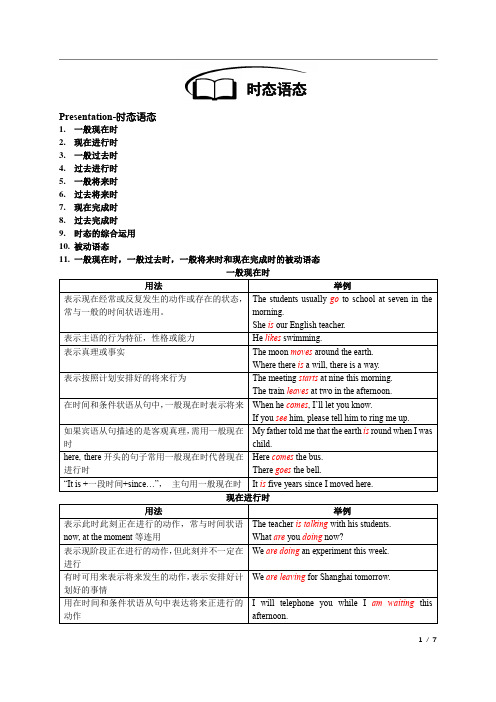
Presentation-时态语态1.一般现在时2.现在进行时3.一般过去时4.过去进行时5.一般将来时6.过去将来时7.现在完成时8.过去完成时9.时态的综合运用10.被动语态11.一般现在时,一般过去时,一般将来时和现在完成时的被动语态一般现在时用法举例表示现在经常或反复发生的动作或存在的状态,常与一般的时间状语连用。
The students usually go to school at seven in the morning.She is our English teacher.表示主语的行为特征,性格或能力He likes swimming.表示真理或事实The moon moves around the earth.Where there is a will, there is a way.表示按照计划安排好的将来行为The meeting starts at nine this morning.The train leaves at two in the afternoon.在时间和条件状语从句中,一般现在时表示将来When he comes, I’ll let you know.If you see him, please tell him to ring me up.如果宾语从句描述的是客观真理,需用一般现在时My father told me that the earth is round when I was child.here, there开头的句子常用一般现在时代替现在进行时Here comes the bus. There goes the bell.“It is +一段时间+since…”,主句用一般现在时It is five years since I moved here.现在进行时用法举例表示此时此刻正在进行的动作,常与时间状语now, at the moment等连用The teacher is talking with his students. What are you doing now?表示现阶段正在进行的动作,但此刻并不一定在进行We are doing an experiment this week.有时可用来表示将来发生的动作,表示安排好计划好的事情We are leaving for Shanghai tomorrow.用在时间和条件状语从句中表达将来正进行的动作I will telephone you while I am waiting this afternoon.时态语态I will think about it while you are giving the reporttonight.描述事实状态的动词不用进行时I have two brothers.This house belongs to my sister.描述心理状态的动词不用进行时I need your help.He loves her very much.瞬间动词不用进行时I accept your advice.部分系动词不用进行时You seem a little tired.用法举例表示过去某个特定时间发生的动作或存在的状态He suddenly fell ill yesterday.The engine stopped because the fuel was used up.表示过去经常发生的动作或存在的状态I wrote home once a week at college.He was already in the habit of reading widely in hisboyhood.表示过去连续发生的一系列动作The students got up early in the morning, didmorning exercises and then read English aloud inthe open air.在时间,条件状语从句中表示过去将要发生的动作We would not leave until the teacher came back. She told me she would not go if it rained the next day.用used to+动词原形,的结构表示过去经常性的行为,一般表示现在已不存在的行为或状态。
初中英语四种时态归纳总结
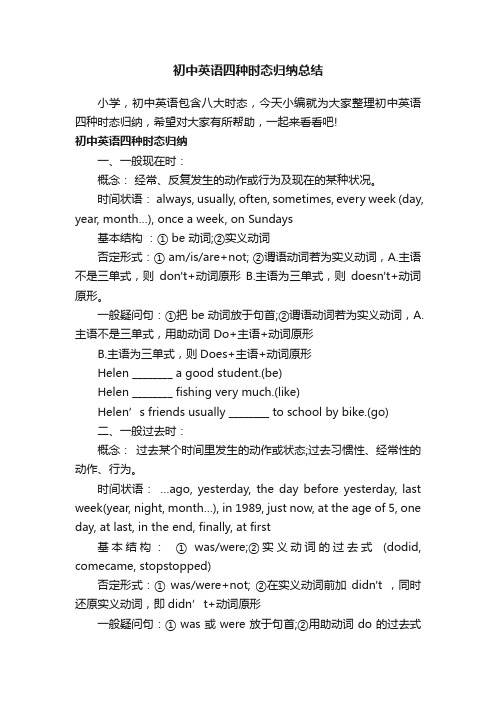
初中英语四种时态归纳总结小学,初中英语包含八大时态,今天小编就为大家整理初中英语四种时态归纳,希望对大家有所帮助,一起来看看吧!初中英语四种时态归纳一、一般现在时:概念:经常、反复发生的动作或行为及现在的某种状况。
时间状语: always, usually, often, sometimes, every week (day, year, month…), once a week, on Sundays基本结构:① be 动词;②实义动词否定形式:① am/is/are+not; ②谓语动词若为实义动词,A.主语不是三单式,则don't+动词原形B.主语为三单式,则doesn't+动词原形。
一般疑问句:①把 be 动词放于句首;②谓语动词若为实义动词,A.主语不是三单式,用助动词 Do+主语+动词原形B.主语为三单式,则Does+主语+动词原形Helen ________ a good student.(be)Helen ________ fishing very much.(like)Helen’s friends usually ________ to school by bike.(go)二、一般过去时:概念:过去某个时间里发生的动作或状态;过去习惯性、经常性的动作、行为。
时间状语:…ago, yesterday, the day before yesterday, last week(yea r, night, month…), in 1989, just now, at the age of 5, one day, at last, in the end, finally, at first基本结构:① was/were;②实义动词的过去式(dodid, comecame, stopstopped)否定形式:① was/were+not; ②在实义动词前加didn't ,同时还原实义动词,即didn’t+动词原形一般疑问句:① was 或 were 放于句首;②用助动词 do 的过去式did 提问,同时还原实义动词。
中考英语时态总结
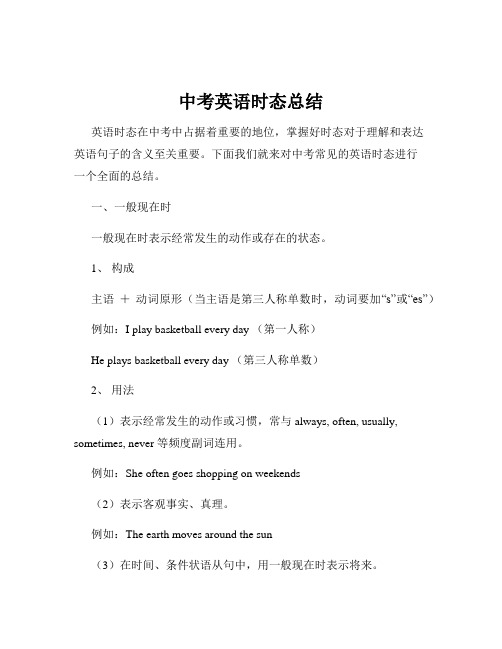
中考英语时态总结英语时态在中考中占据着重要的地位,掌握好时态对于理解和表达英语句子的含义至关重要。
下面我们就来对中考常见的英语时态进行一个全面的总结。
一、一般现在时一般现在时表示经常发生的动作或存在的状态。
1、构成主语+动词原形(当主语是第三人称单数时,动词要加“s”或“es”)例如:I play basketball every day (第一人称)He plays basketball every day (第三人称单数)2、用法(1)表示经常发生的动作或习惯,常与 always, often, usually, sometimes, never 等频度副词连用。
例如:She often goes shopping on weekends(2)表示客观事实、真理。
例如:The earth moves around the sun(3)在时间、条件状语从句中,用一般现在时表示将来。
例如:If it rains tomorrow, we won't go for a picnic 二、一般过去时一般过去时表示过去发生的动作或存在的状态。
1、构成主语+动词的过去式例如:I went to Beijing last year2、用法(1)表示过去某个时间发生的动作或存在的状态。
例如:He was at home yesterday(2)表示过去经常或反复发生的动作。
例如:My father often smoked when he was young 三、一般将来时一般将来时表示将来要发生的动作或存在的状态。
1、构成(1)“will +动词原形”例如:I will visit my grandparents next week(2)“be going to +动词原形”例如:He is going to play football tomorrow2、用法(1)表示将来要发生的动作或存在的状态。
初中英语中考必会时态归纳(共16种)
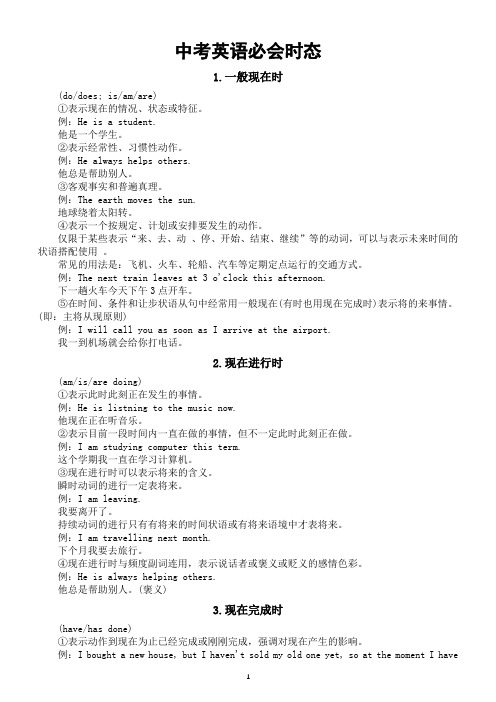
中考英语必会时态1.一般现在时(do/does; is/am/are)①表示现在的情况、状态或特征。
例:He is a student.他是一个学生。
②表示经常性、习惯性动作。
例:He always helps others.他总是帮助别人。
③客观事实和普遍真理。
例:The earth moves the sun.地球绕着太阳转。
④表示一个按规定、计划或安排要发生的动作。
仅限于某些表示“来、去、动、停、开始、结束、继续”等的动词,可以与表示未来时间的状语搭配使用。
常见的用法是:飞机、火车、轮船、汽车等定期定点运行的交通方式。
例:The next train leaves at 3 o'clock this afternoon.下一趟火车今天下午3点开车。
⑤在时间、条件和让步状语从句中经常用一般现在(有时也用现在完成时)表示将的来事情。
(即:主将从现原则)例:I will call you as soon as I arrive at the airport.我一到机场就会给你打电话。
2.现在进行时(am/is/are doing)①表示此时此刻正在发生的事情。
例:He is listning to the music now.他现在正在听音乐。
②表示目前一段时间内一直在做的事情,但不一定此时此刻正在做。
例:I am studying computer this term.这个学期我一直在学习计算机。
③现在进行时可以表示将来的含义。
瞬时动词的进行一定表将来。
例:I am leaving.我要离开了。
持续动词的进行只有有将来的时间状语或有将来语境中才表将来。
例:I am travelling next month.下个月我要去旅行。
④现在进行时与频度副词连用,表示说话者或褒义或贬义的感情色彩。
例:He is always helping others.他总是帮助别人。
(褒义)3.现在完成时(have/has done)①表示动作到现在为止已经完成或刚刚完成,强调对现在产生的影响。
(中考英语资料)初中英语语法八大时态总结(完整版)含答案

初中英语语法八大时态一.一般现在时1. 结构肯定句式: 主语+动词原形/动词的第三人称单数+其他否定句式: 主语+(助动词)don't/doesn't +动词原形+其他一般疑问句式: Do/Does+主语+动词原形+其他简略回答: (肯)Yes,主语+do/does (否)No,主语+do/does not缩写形式: don't = do not doesn't = does not例句:He often goes swimming in summer.I usually leave home for school at 7 every morning.2.用法1)表示经常的、习惯性的动作或存在的状态,常与表示频度的副词连用。
常用的频度副词有:always、often、usually、seldom、never、sometimes, every week (day, year, month…), once a week, on Sundays.频度副词在句中通常放在行为动词之前,系动词、助动词之后。
例如: He often goes swimming in summer.I usually leave home for school at 7 every morning.2)表示主语具备的性格、特征和能力等。
例如:All my family love football .My sister is always ready to help others .Ann writes good English but does not speak well.3)表示客观真理、客观存在、自然现象。
例如:The earth moves around the sun. Shanghai lies in the east of China.4)表示按计划或安排好的,或将要发生的动作,可用一般现在时表将来。
四种时态的知识点

四种时态的知识点时态是表示动作发生的时间的一种语法形式。
汉语时态相对简单,只有过去时、现在时和将来时三种时态。
而英语的时态就要复杂得多,主要有四种时态:一般现在时、一般过去时、一般将来时和现在进行时。
1.一般现在时一般现在时表示经常性的、反复发生的动作,或者客观事实、自然规律。
语法结构:主语+动词原形(第三人称单数要加-s)例句:- I play football every Sunday.(我每个星期天踢足球。
)- She knows the answer.(她知道答案。
)2.一般过去时一般过去时表示过去一些时间发生的动作或状态。
语法结构:主语+动词过去式例句:- They went to the beach last weekend.(他们上个周末去了海滩。
)- We played basketball yesterday.(我们昨天打篮球。
)3.一般将来时一般将来时表示将来一些时间将要发生的动作或事情。
语法结构:将来时的构成一般由助动词will或shall加动词原形例句:- I will visit my grandparents next month.(下个月我将会去看望我的祖父母。
)- He shall cook dinner for us tonight.(今晚他将为我们做晚饭。
)4.现在进行时现在进行时表示现在正在进行或发生的动作。
语法结构:主语 + be动词(am/is/are) + 动词的ing形式例句:- They are watching a movie now.(他们现在正在看电影。
- She is studying for the exam at the moment.(她此刻正在为考试学习。
)补充的其他用法:- 过去将来时:表示过去现在时,通常由would/should + 动词原形构成,用于表示过去一些时间本来会发生的动作,但实际上没有发生。
- 现在完成时:表示过去一些时间发生的动作对现在造成的影响或结果。
中考英语时态基础知识点(现在完成时、将来时、过去时、现在进行时、一般现在时)以及习题整理
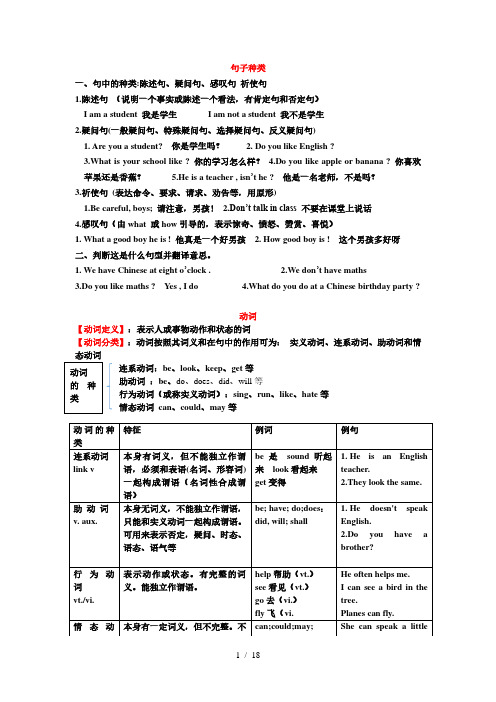
句子种类一、句中的种类:陈述句、疑问句、感叹句 祈使句1.陈述句 (说明一个事实或陈述一个看法,有肯定句和否定句) I am a student 我是学生 I am not a student 我不是学生2.疑问句(一般疑问句、特殊疑问句、选择疑问句、反义疑问句) 1. Are you a student? 你是学生吗? 2. Do you like English ?3.What is your school like ? 你的学习怎么样?4.Do you like apple or banana ? 你喜欢苹果还是香蕉?5.He is a teacher , isn ’t he ? 他是一名老师,不是吗? 3.祈使句 (表达命令、要求、请求、劝告等,用原形)1.Be careful, boys; 请注意,男孩!2.Don’t talk in class 不要在课堂上说话 4.感叹句(由what 或how 引导的,表示惊奇、愤怒、赞赏、喜悦)1. What a good boy he is ! 他真是一个好男孩2. How good boy is ! 这个男孩多好呀 二、判断这是什么句型并翻译意思。
1. We have Chinese at eight o ’clock .2.We don ’t have maths3.Do you like maths ? Y es , I do4.What do you do at a Chinese birthday party ?动词【动词定义】:表示人或事物动作和状态的词【动词分类】:动词按照其词义和在句中的作用可为: 实义动词、连系动词、助动词和情态动词连系动词:be 、look 、keep 、get 等 助动词 :be 、do 、does 、did 、will 等 行为动词(或称实义动词):sing 、run 、like 、hate 等 情态动词 can 、could 、may 等提问: 1.举出三个系动词,并说出它的特征。
初中英语中考必考时态结构及用法详解(共八种)
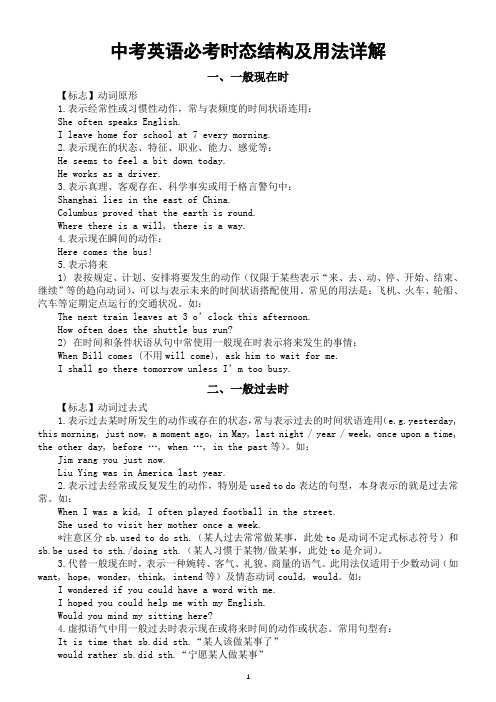
中考英语必考时态结构及用法详解一、一般现在时【标志】动词原形1.表示经常性或习惯性动作,常与表频度的时间状语连用:She often speaks English.I leave home for school at 7 every morning.2.表示现在的状态、特征、职业、能力、感觉等:He seems to feel a bit down today.He works as a driver.3.表示真理、客观存在、科学事实或用于格言警句中:Shanghai lies in the east of China.Columbus proved that the earth is round.Where there is a will, there is a way.4.表示现在瞬间的动作:Here comes the bus!5.表示将来1) 表按规定、计划、安排将要发生的动作(仅限于某些表示“来、去、动、停、开始、结束、继续”等的趋向动词),可以与表示未来的时间状语搭配使用。
常见的用法是:飞机、火车、轮船、汽车等定期定点运行的交通状况。
如:The next trai n leaves at 3 o’clock this afternoon.How often does the shuttle bus run?2) 在时间和条件状语从句中常使用一般现在时表示将来发生的事情:When Bill comes (不用will come), ask him to wait for me.I shall go there tomorrow unless I’m too busy.二、一般过去时【标志】动词过去式1.表示过去某时所发生的动作或存在的状态,常与表示过去的时间状语连用(e.g.yesterday, this morning, just now, a moment ago, in May, last night / year / week, once upon a time, the other day, before …, when …, in the past等)。
初三英语时态

初三英语时态
初三英语时态主要包括一般现在时、一般过去时、一般将来时、现在进行时、过去进行时和现在完成时等。
这些时态在英语表达中有着不同的用法和意义,需要掌握其基本结构和用法规则。
1.一般现在时:表示经常发生或反复发生的动作或
状态,常用动词如be, have, do等。
例如:I have a pen.
2.一般过去时:表示过去某个时间发生的动作或状
态,常用动词如was, were, did等。
例如:She was a student.
3.一般将来时:表示将来某个时间将要发生的动作
或状态,常用动词如will, shall等。
例如:I will go to the park tomorrow.
4.现在进行时:表示正在进行的动作或状态,常用
动词如be, doing等。
例如:He is playing basketball.
5.过去进行时:表示过去某个时间正在进行的动作
或状态,常用动词如was, were等。
例如:They were playing soccer at 3 o'clock yesterday.
6.现在完成时:表示过去发生的动作或状态对现在
的影响或结果,常用动词如have, has等。
例如:I have finished my homework.
在初三英语中,时态是重要的语法知识之一,需要学生通过多读、多写、多听、多练来掌握其用法和规则。
同时,学生还需要注意不同时态之间的区别和联系,以免混淆使用。
中考需要掌握的8种时态
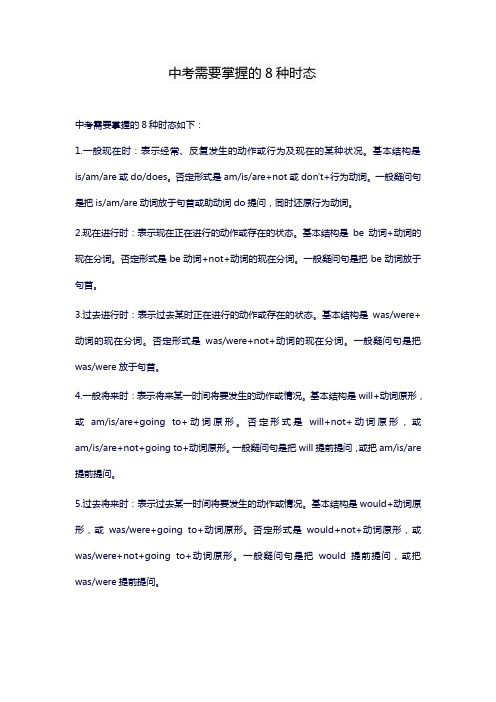
中考需要掌握的8种时态中考需要掌握的8种时态如下:1.一般现在时:表示经常、反复发生的动作或行为及现在的某种状况。
基本结构是is/am/are或do/does。
否定形式是am/is/are+not或don't+行为动词。
一般疑问句是把is/am/are动词放于句首或助动词do提问,同时还原行为动词。
2.现在进行时:表示现在正在进行的动作或存在的状态。
基本结构是be动词+动词的现在分词。
否定形式是be动词+not+动词的现在分词。
一般疑问句是把be动词放于句首。
3.过去进行时:表示过去某时正在进行的动作或存在的状态。
基本结构是was/were+动词的现在分词。
否定形式是was/were+not+动词的现在分词。
一般疑问句是把was/were放于句首。
4.一般将来时:表示将来某一时间将要发生的动作或情况。
基本结构是will+动词原形,或am/is/are+going to+动词原形。
否定形式是will+not+动词原形,或am/is/are+not+going to+动词原形。
一般疑问句是把will提前提问,或把am/is/are 提前提问。
5.过去将来时:表示过去某一时间将要发生的动作或情况。
基本结构是would+动词原形,或was/were+going to+动词原形。
否定形式是would+not+动词原形,或was/were+not+going to+动词原形。
一般疑问句是把would提前提问,或把was/were提前提问。
6.现在完成时:表示过去发生的动作持续到现在,并可能继续下去。
基本结构是have/has+过去分词。
否定形式是have/has+not+过去分词。
一般疑问句是把have/has提前提问。
7.过去完成时:表示过去的过去某一时间之前已经完成的动作或情况。
基本结构是had+过去分词。
否定形式是had+not+过去分词。
一般疑问句是把had提前提问。
8.一般过去时:表示在过去某个时间发生的动作或情况。
中考英语八种时态总结

.中考英语八大时态总结一、一般现在时:概念:经常、反复发生的动作或行为及现在的某种状况。
时间状语:always, usually, often, sometimes, every week (day, year, month…), oncea week, on Sundays, etc.基本结构:①be动词;②行为动词否定形式:①am/is/are+not;②此时态的谓语动词若为行为动词,则在其前加don't,如主语为第三人称单数,则用doesn't,同时还原行为动词。
一般疑问句:①把be动词放于句首;②用助动词do提问,如主语为第三人称单数,则用does,同时,还原行为动词。
1、多数在动词后加s play—plays like—likes ,2、以s,x,sh,ch,o结尾的动词加es wash–washes catch–catches do–does3、以辅音字母加y结尾,把y改i再加es fly—flies study—studies4、以元音字母加y结尾,直接加s buy – buys5、不规则变化have—has..二、一般过去时:概念:过去某个时间里发生的动作或状态;过去习惯性、经常性的动作、行为。
时间状语:ago, yesterday, the day before yesterday, last week(year, night,month…), in 1989, just now, at the age of 5, one day, long long ago, once upon a time, etc.基本结构:①be动词;②行为动词否定形式:①was/were+not;②在行为动词前加didn't,同时还原行为动词。
一般疑问句:①was或were放于句首;②用助动词do的过去式did 提问,同时还原行为动词。
1.一般在动词末尾加-ed 如:watch-watched, cook-cooked2.结尾是e加d 如:taste-tasted3.末尾只有一个元音字母和一个辅音字母的重读闭音节,应双写末尾的辅音字母,再加-ed,如:stop-stopped4.以“辅音字母+y”结尾的,变y为i,再加-ed,如:study-studied5.不规则动词过去式:am,is-was, are-were, do-did, see-saw, say-said, give-gave…句型:1、Be动词在一般过去时中的变化:⑴am 和is变为was。
初中英语时态总结
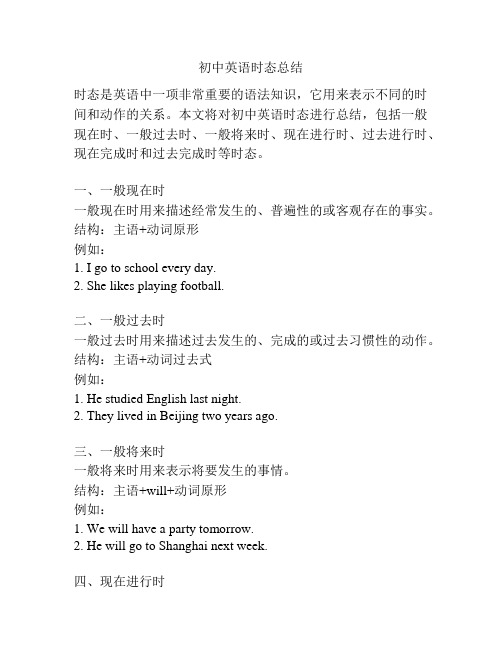
初中英语时态总结时态是英语中一项非常重要的语法知识,它用来表示不同的时间和动作的关系。
本文将对初中英语时态进行总结,包括一般现在时、一般过去时、一般将来时、现在进行时、过去进行时、现在完成时和过去完成时等时态。
一、一般现在时一般现在时用来描述经常发生的、普遍性的或客观存在的事实。
结构:主语+动词原形例如:1. I go to school every day.2. She likes playing football.二、一般过去时一般过去时用来描述过去发生的、完成的或过去习惯性的动作。
结构:主语+动词过去式例如:1. He studied English last night.2. They lived in Beijing two years ago.三、一般将来时一般将来时用来表示将要发生的事情。
结构:主语+will+动词原形例如:1. We will have a party tomorrow.2. He will go to Shanghai next week.四、现在进行时现在进行时用来描述现在正在进行的动作或状态。
结构:主语+be(am, is, are)+动词-ing例如:1. She is studying for the test now.2. They are playing basketball in the park.五、过去进行时过去进行时用来描述过去某个时间正在进行的动作。
结构:主语+was/were+动词-ing例如:1. I was studying when she called me.2. They were cooking dinner at 7 o'clock yesterday.六、现在完成时现在完成时用来表示过去发生的动作对现在造成的影响或与现在相关的动作。
结构:主语+have/has+动词过去分词例如:1. He has finished his homework.2. We have visited the Great Wall.七、过去完成时过去完成时用来表示过去某个时间或动作之前已经完成的动作。
2024年中考英语各种时态的讲解

一般现在时:表示现在的状态、经常的或习惯性的动作、主语具备的性格和能力等。
1.时间状语:Always, usually, often, sometimes, every week (day, year, month…),once a week(day, year, month…),on Sundays(on Mondays …).2.基本结构:主语+be/do+其他;(如主语为第三人称单数,动词上要改为第三人称单数形式)。
否定形式:主语+ am/is/are + not + 其他(此时态的谓语动词若为行为动词,则在其前加don't,如主语为第三人称单数,则用doesn't,同时还原行为动词)。
一般疑问句:把be动词放于句首;用助动词do提问,如主语为第三人称单数,则用does,同时,还原行为动词。
I am a student.I am not a student.Am I a student?Yes, you are./No, you arenot.I like oranges.I do not likeoranges.Do I like oranges?Yes, you do./No, youdo not.一般过去时概念:表示过去某个时间内(或某一段时间内)发生的动作或存在的状态,过去经常或反复发生的动作。
时间状语:ago, yesterday, the day before yesterday, last week, last(year, night, month…),in1989,just now, at the age of 5,one day, long long ago, once upon a time, etc.基本结构:主语+ 动词的过去式或be的过去式+名词。
否定形式:主语+ was/were + not + 其他(在行为动词前加didn't,同时还原行为动词)。
中考英语一般考些什么时态

【导语】中考是升⼊⾼中的⾸要条件,⽽⼤家的中考成绩决定同学们是否能够报读⼀所理想的⾼中,所以在中考前同学们要时刻关注着最新的中考动态。
那考⽣们知道中考英语⼀般考些什么时态吗?如果还不清楚,⽆忧考为考⽣整理了中考英语⼀般考些什么时态的资讯,欢迎阅读!中考英语的时态 问:中考英语⼀般考些什么时态 答:⼀、⼀般现在时 表⽰经常性或习惯性的动作,或存在的状态,还表⽰主语具备的性格和能⼒及客观真理。
⼆、⼀般过去时 在⼀般过去时的句⼦中,谓语动词可分为两类⼀类是be动词,其形式为was与第⼀、三⼈称单数连⽤,were与第⼆⼈称和复数⼈称的主语连⽤。
凡是由be动词做谓语的句⼦,变否定句时,直接在其后加not,即wasn’t或weren’t,变⼀般疑问句将was/were放在句⾸,句末⽤问号。
三、⼀般将来时 表⽰将要发⽣的动作或存在的状态。
四、过去将来时 表⽰过去的某时以后将要发⽣的动作。
但这个"将来"时间绝不会延伸到“现在”;⽽仅限于“过去时间区域内”。
由此可以看出,含这个时态的句⼦常带⼀个表⽰“过去某个时间点”的状语。
这个状语或是⼀个短语,或是⼀个句⼦。
五、现在进⾏时 由Be(am/is/are)+动词—ing构成。
六、过去进⾏时 表⽰过去某⼀时刻或某⼀段时间正在进⾏或发⽣的动作。
动作发⽣的特指时间常⽤⼀个短语或时间状语从句来表明。
七、现在完成时 现在完成时⽤来表⽰现在之前已发⽣或完成的动作或状态,但其结果却和现在有联系,也就是说,动作或状态发⽣在过去但它的影响现在还存在。
⼋、过去完成时 过去完成时表⽰过去某⼀时间或某⼀事件之前已经发⽣的动作或状态,即过去的过去。
中考注意事项 答卷开始后,考⽣在答题时可按照个⼈的答题习惯先易后难,答题时要注意稳扎稳打,对绝对有把握的题⽬要确保拿满分;对有⼀定难度的题⽬要争取拿⾼分;对把握不⼤的题⽬则可暂时跳过,待做完其他题⽬后再作答,说不定解其他题后,有可能受到启发发现解答难题的途径。
- 1、下载文档前请自行甄别文档内容的完整性,平台不提供额外的编辑、内容补充、找答案等附加服务。
- 2、"仅部分预览"的文档,不可在线预览部分如存在完整性等问题,可反馈申请退款(可完整预览的文档不适用该条件!)。
- 3、如文档侵犯您的权益,请联系客服反馈,我们会尽快为您处理(人工客服工作时间:9:00-18:30)。
中考英语四大基本时态12He plays basketball every day .他每天都打篮球。
He is playing basketball on the playground now .她现在正在操场上打篮球。
He played basketball last week .他上周打了篮球。
He will play basketball with his classmates tomorrow .明天他会和同学一起打篮球。
时态时态是表示动作和状态在不同时间下的动词形式。
一般现在时现在进行时一般过去时一般将来时一般现在时基本构成be动词型:句子的谓语动词只有be动词(am, is或are)。
肯定句:主语+be (am, is, are)+其它They are from America.否定句:主语+ be + not +其它They are not from America.一般疑问句:Be +主语+其它Are they from America?特殊疑问句:特殊疑问词+一般疑问句Where are they from?实义动词型:句中的谓语动词为实义动词。
肯定句:主语+行为动词+其它He goes to school by bike.否定句:主语+ don't ( doesn't ) +动词原形(+其它)He doesn't go to school by bike.一般疑问句:Do ( Does ) +主语+动词原形+其它Does he go to school by bike?特殊疑问句:特殊疑问词+一般疑问句How does he go to school?31. 一般情况,加-s。
put-puts, give-gives2. 以s, sh, ch, x等结尾的词,加-es。
wash-washes, catch-catches3. 以辅音字母+y结尾的词,变y为i再加-es。
study-studies, fly-flies4. 以字母o结尾的词,加-es。
go-goes, do-does动词第三人称单数变化规则4基本用法表示习惯性,永久性或反复发生的动作,常与频率副词often, usually, always等连用。
She always takes a walk in the evening.表示特征,能力或现时的情况或状态。
She loves music. The boy can swim.表示普遍真理,客观存在或科学事实。
The earth moves around the sun.在由when, if, as soon as等引导的时间、条件状语从句中,用一般现在时代替一般将来时。
If it doesn't rain tomorrow, I will go to the park. As soon as he comes back, I will tell you.主将从现5现在进行时基本构成am/is/are+动词的现在分词+其它成分。
否定句:主语+am/is/are+not+动词的现在分词+其它成分They are not sleeping in the bedroom.一般疑问句:am/is/are+主语+动词的现在分词+其它成分Are they swimming in the bedroom?特殊疑问句:特殊疑问词+am/is/are+主语+动词的现在分词+其它成分Where are they swimming?61. 一般情况下,直接在动词词尾加-ing。
play→playing look→looking bring→bringing2. 以辅音字母加e结尾的动词,需要去掉e,再加ing。
take→taking have→having hate→hating3. 以重读闭音节结尾,末尾只有一个辅音字母的动词,要双写这个辅音字母,再加-ing。
put→putting stop→stopping begin→beginning4. 以ie结尾的词,改ie为y,再加-ing。
lie→lying die→dying动词现在分词变化规则7基本用法表示现在正在进行的动作,常与n o w,a t t h e moment, look, listen等连用。
It is raining heavily outside now.Listen, the girl is singing in the next room.用现在进行时表示将来,常用这种结构的动词有go, come, leave, stay等位移性动词,表示即将发生或安排好要做的事情。
We are leaving for Shanghai.The bus is coming soon.8一般过去时基本构成be动词型:句子的谓语动词只有be动词(was或were)。
肯定句:主语+be (was, were)+其它He was in the room.否定句:主语+ be + not +其它He was not in the room.一般疑问句:Be +主语+其它Was he in the room?特殊疑问句:特殊疑问词+一般疑问句Where was he?实义动词型:句中的谓语动词为实义动词。
肯定句:主语+行为动词+其它He left Beijing yesterday.否定句:主语+ didn't +动词原形(+其它)He didn't leave Beijing yesterday.一般疑问句:Did+主语+动词原形+其它Did he leave Beijing yesterday?特殊疑问句:特殊疑问词+一般疑问句When did he leave Beijing?91.一般情况下,在动词原形后面加-ed。
look→looked play→played2.以不发音e结尾的动词,在词尾直接加-d。
live→lived use→used3.以“辅音字母+ y”结尾的动词,先将y改为i ,再加–ed。
study→studied try→tried4.以重读闭音节(即辅音字母+元音字母+辅音字母),末尾只有一个辅音字母的动词,要先双写这个辅音字母后,再加–ed。
stop→stopped plan→planned动词过去式规则变化10基本用法表示过去发生的而现在已经结束的事情、动作或情况,常和明确的过去时间状语连用,如:yesterday,last week, three days ago等。
My brother got married last week.表示过去的习惯性动作或状态,句中常带有every day, often, usually, always, sometimes 等状语。
When she was in that city, she often went to the Central Supermarket.11一般将来时基本构成shall/will+动词原形(shall用于第一人称,will可用于所有人称)I shall buy a new desk.Shall we have take a walk after dinner?They will not tell the secret to others.be(am, is, are) going to+动词原形It is going to rain.Are you going to see a film?12基本用法表示将来要发生的动作或存在的状态。
I shall be late home tonight.表示有计划或安排将来要去做的事。
I'm going to see you after work.13VSü表示说话人的愿望或想法ü表示必然性,注定要发生的事情ü没有经过事前考虑的意图ü表示打算、计划将要做的事情ü客观迹象表明将要发生的事情ü事前考虑过的意图I think China will become stronger and stronger.Fish will die out of water.Our school is going to hold the sports meeting next week.Her face becomes red. She is going to get better.—Why do you put off all the pictures?—I am going to repaint the wall.—The box is too heavy to carry.—Oh, I will help you.14151. He_____at six every day.A. get up B. gets up C. got up D. is getting up2. What did you see ________?A. now B. every day C. just now D. three days3. He went into the room and________ the door.A. lock B. locking C. locks D. locked4. ---What________ you ________ last week? --- I bought a bag.A. did ,buy B. did , bought C. do, buy D. do, bought5. ---________ he________ his lunch? --- Yes, he did.A. Does ,had B. Does, have C. Did, have D. Did, had6.They________books every day in the library.A. readsB. readC. readingD. readed7. I like watching TV, but my mother________ like it.A. don‘tB. doesn’tC. doesD. didn‘t8. ________ your father drink milk every day?A. DoB. AreC. DoesD. is9. We will go shopping if it________ tomorrow.A. don’t rainB. didn’t rainC. doesn‘t rainD. isn‘t rain10. ---When________he get home on Friday?---He gets home at fouron Friday.A. doB. doesC. didD. is16。
